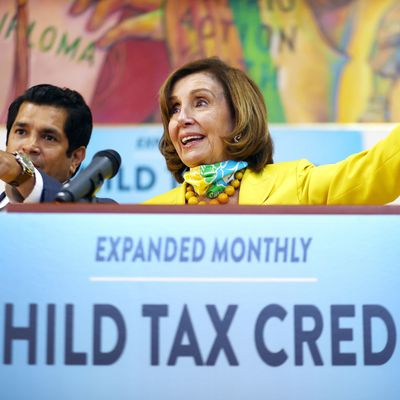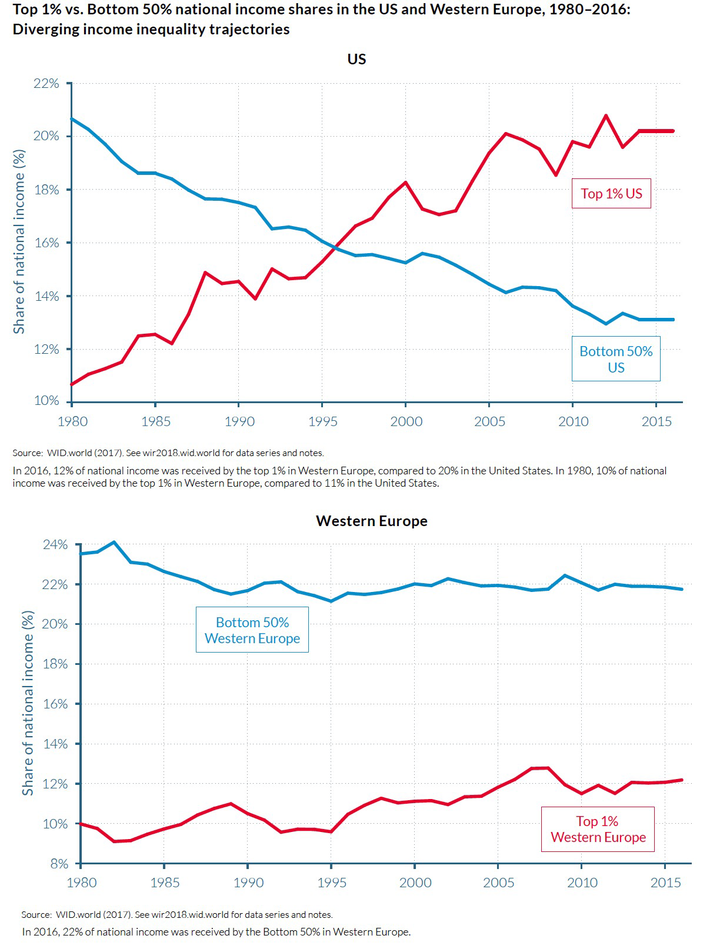
On Thursday, Uncle Sam finally paid his child support.
The governments of Great Britain, Canada, Germany, France — and virtually all other developed countries — have long recognized their responsibility to provide income support to families with young ones. After all, every society depends on parental labor to perpetuate itself. And every child deserves to have their basic needs met, regardless of their caretaker’s employment status or income level.
But the United States didn’t take these truths to be self-evident. Instead, we designed our child-welfare system to deliberately exclude the neediest children in the country so as to punish their parents for not having jobs.
Or at least, this was how we used to operate. The American Rescue Plan changed our government’s approach to family welfare, however temporarily. Joe Biden’s COVID-relief law expanded the Child Tax Credit (CTC) — raising the maximum amount from $2,000 per kid to $3,000 for children 6 to 17 and $3,600 for those 5 and under. Critically, it also made the CTC: (1) fully refundable (meaning parents who owe no taxes still receive the full benefit as a welfare payment), (2) available to all non-rich parents, regardless of their income or employment status, and (3) accessible in monthly installments, rather than as a lump sum at tax time. Together, these changes make the CTC into a de facto child allowance.
Or, more precisely, Biden’s law has turned the CTC into a child allowance pilot program — all of these changes to the CTC are set to expire next year. The Democratic leadership plans to extend the program. Their hope is that once 39 million U.S. families get a taste of the child allowance, their party’s moderates will have a hard time letting it slip away.
The first CTC payment hit Americans’ bank accounts Thursday. Initial reactions lend credence to the White House’s theory: America’s parents seem to like being compensated for their familial labors, no matter their ideological views.
The GOP’s primary response to all this has been to try to gin up outrage about the government helping the shiftless poor. Put more charitably, Republicans have argued that providing unemployed parents with cash aid will only encourage them to luxuriate in their indolence and thus perpetuate their poverty. In Marco Rubio’s words, Biden has transformed the CTC into an “anti-work welfare check.”
I’ve written about the flaws in this argument elsewhere, so I won’t expound upon them much here. But suffice to say: There is very little evidence that providing poor families with cash assistance reduces labor-force participation and a great deal of evidence that doing so improves impoverished children’s later-life outcomes.
Happily, the right has produced a more interesting, and in a sense, more honest critique of Biden’s child allowance. On Tuesday, Fox Business host Stuart Varney condemned the president’s policy — on the grounds that it will be too popular to remain temporary:
Which politician is going to say “No” to money for children? The parents of 70 million youngsters will be getting the money: That’s a very large group of voters. When they get used to the checks, will they vote for politicians who cut them off? And remember, when the government starts to give something, it’s almost impossible to take it away.
This is a big part of the Democrat’s plan to make America much more like Europe. We’re already well along the road to socialized health care. Why not cash for kids? That’s exactly what this is … The Democrats are buying votes.
Okay, Varney’s primary problem with the child allowance isn’t that the policy is popular. Rather, it’s that the new CTC will make America more like Europe and increase the national debt. These are not very strong arguments. Democrats intend to offset the CTC extension with tax hikes on the rich. And the sincerity of Varney’s call for fiscal prudence is suspect given that the anchor was (and is) an enthusiastic supporter of the Trump Tax Cuts, which have already increased the national debt by more than $2.3 trillion. Meanwhile, it’s unclear why making the U.S. more like Europe in the domain of welfare policy is supposed to be self-evidently bad. It is true that the E.U. has significant economic problems. But it is also true that the citizens of the continent’s most socialistic nations report higher levels of “life satisfaction” than those of most any other developed country.
To be fair, Varney does seem to recognize that voters like social democratic policies. That is, more or less, his secondary objection to the CTC; that the Democrats’ embrace of the policy represents a craven act of pandering to the popular will. Varney’s argument seems to be that elected officials have a responsibility to avoid competing on the basis of how much aid they can deliver to the public, lest they end up in a race to the bottom. To violate this tacit gentleman’s agreement is to corrupt the political system through mass bribery. Democrats are, in his words, “buying votes.”
This sentiment has a long pedigree on the right. It is essentially an updated version of 19th-century conservatives’ arguments against mass democracy: That granting all men political equality would render government hostage to the imprudent, extortionate appetites of popular majorities. As the chancellor of New York, James Kent, argued at the Empire State’s Constitutional Convention in 1820, “the tendency of universal suffrage is to jeopardize the rights of property and the principles of liberty.”
Kent’s argument failed, of course. But conservative elites never fully shook his basic fear: that in a system of universal suffrage, commoners would use their numerical supremacy to challenge their betters’ economic supremacy. Thus, once democracy became a foregone conclusion, conservatives in both major parties sought to combat this threat by removing large swathes of economic policymaking from democratic control (e.g., through central bank independence and judicial review) and stigmatizing public spending.
For much of the past four decades, these tactics worked quite well. Under Paul Volcker’s leadership, the Federal Reserve used its insulation from democratic accountability to lick inflation by engineering a brutal recession. This approach to the problem of high prices proved quite costly for America’s working class and developing countries the world over. It also had a wide array of world-changing consequences that elite technocrats failed to anticipate, such as the explosive growth of America’s financial industry and utter destruction of the nation’s manufacturing base. Nevertheless, mainstream discourse celebrated Volcker as a consummate public servant — not in spite of his willingness to impose devastating austerity on the public through willfully deceptive means, but because of it. Similarly, in more recent years, the political media routinely cast deficit reduction as an objective good and politicians who supported cutting Social Security to secure that good as noble statesmen — not in spite of their position’s unpopularity, but because of it.
The right itself has no principled commitment to balanced budgets. Its concern is with the balance of economic power. Conservatives do not want working-class voters to exchange their ballots for a greater share of the nation’s economic resources. Mitt Romney spoke to this concern in 2012, when addressing a group of Republican donors. “There are 47 percent of the people who will vote for [Barack Obama] no matter what,” the then-GOP nominee explained. “All right, there are 47 percent who are with him, who are dependent upon government, who believe that they are victims, who believe the government has a responsibility to care for them, who believe that they are entitled to health care, to food, to housing, to you name it. That that’s an entitlement. And the government should give it to them.”
Like Varney, Romney described the phenomenon of politicians providing public services to working-class people in order to win their electoral allegiance as a kind of cheating or civic corruption.
But this is actually a description of democratic health.
Electoral incentives surely pose genuine challenges for sound public policy. Advancing the general welfare does sometimes require policymakers to privilege long-term outcomes over short-term ones. And the imperative to win reelection every two or four or six years can make that task difficult, as our nation’s woefully insufficient response to climate change well illustrates.
Nevertheless, allowing technocrats to override popular passions, and manage the economy as economic elites see fit, tends to go poorly for non-elites. The era of central bank independence was one of stagnant wages, mediocre growth, and meteoric inequality. Today, few economists will defend the elite consensus in favor of deficit reduction circa 2011, a policy that would have further weakened the tepid post-2008 recovery (and which was contemporaneously justified by research findings that derived from an Excel error). Congress’s response to the COVID recession — to enact large, popular relief measures (a.k.a. to “buy votes”) — proved to be much more macroeconomically sound than anything “brave” entitlement reformers wished to do a decade earlier.
One can imagine scenarios in which it would be wise for elected officials to implement economic reforms in defiance of popular will. But the idea that U.S. economic policy is excessively deferential to the desires of ordinary voters — to the point that Biden’s willingness to indulge their whims further is a kind of corruption — is quite strange. American workers receive less social support than their counterparts in almost every OECD country, while America’s rich pay lower effective tax rates than their peers in comparably prosperous nations. The richest one percent of Americans have seen their share of national income nearly double over the past four decades, while the bottom 50 percent has seen its share fall by nearly half. By just about any metric, we are among the least economically egalitarian nations in the world. It is hard to look at this chart and conclude, “U.S. policymakers have been doing too much to make life easier for working people in a cynical bid to buy their votes.”
In truth, America could use far more “vote buying.” The problem with our economic system is not that it gives too much deference to popular needs, but too little. Further, if recent U.S. history is any guide, the alternative to political parties “buying votes” — which is to say, competing on the basis of who can deliver more material aid to the electorate — is political parties competing on the basis of who can more effectively stoke cultural resentments and ethnic grievances.
Varney is undoubtedly right that Democrats are trying to trade public services for electoral support. In fact, that reactionary trope is truer today than it’s been in half a century. Democrats aren’t just sending millions of households checks every month while going out of their way to advertise that fact. They’re also planning a host of other social welfare expansions. Among these is the addition of dental, hearing, and vision benefits to Medicare, a policy consciously aimed at aiding the party with older voters in the 2022 midterm.
Which is good. Political parties designing policy with an eye toward winning voters’ approval is not corruption; it’s democracy. Conservatives may believe that those two things are one and the same. But the people beg to differ.































